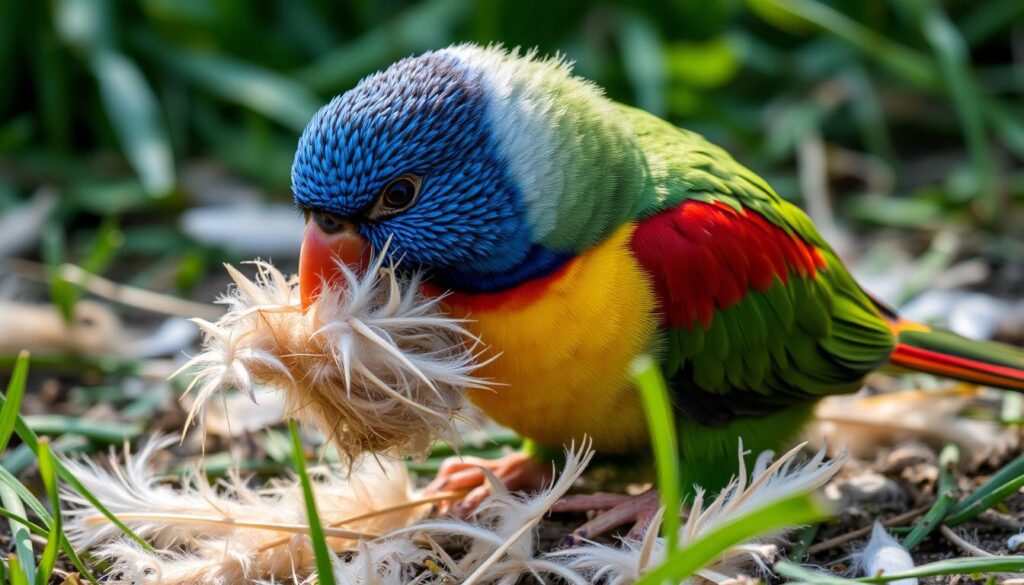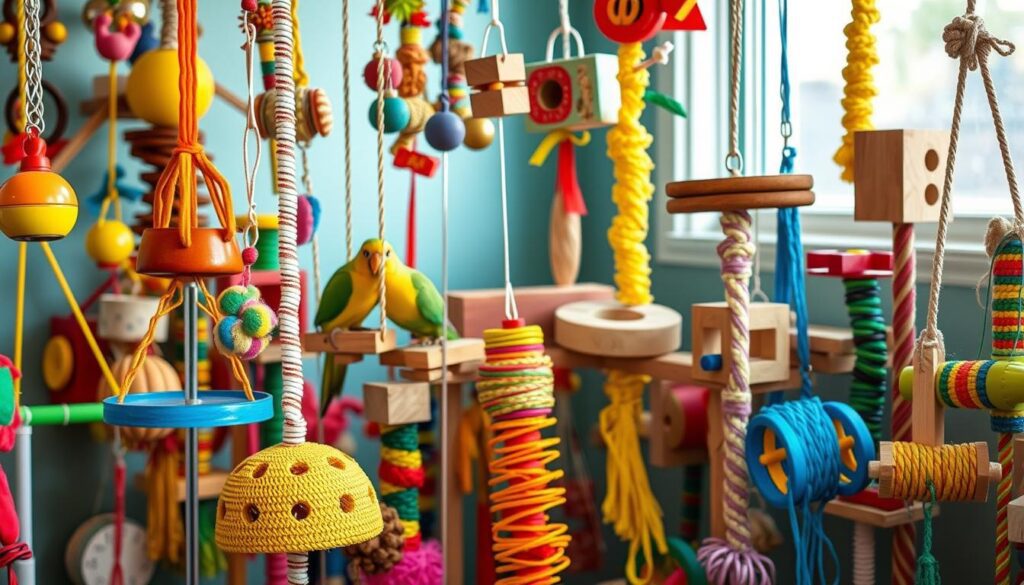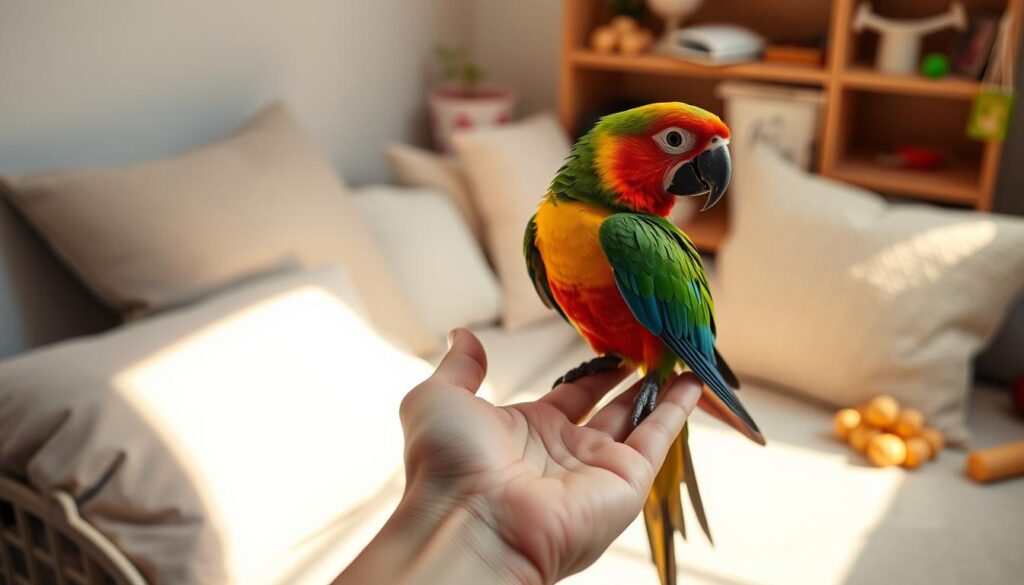Imagine the joy of coming home to a cheerful chirp, the gentle flapping of wings, and the vibrant colors of your feathered friend. Now imagine, after a long day, finding your beloved bird with patches of missing feathers, looking distressed and disheveled. You may wonder, “Why is my bird plucking its feathers, and how can I stop it?” Feather plucking is a surprisingly common behavior among pet birds, yet it can signal underlying issues that need attention. As devoted bird owners, understanding the reasons behind this distressing act of feather plucking is crucial for both the health of our avian companions and our peace of mind.
Bird feather plucking can stem from a variety of causes, such as stress, boredom, or even medical conditions. Recognizing the symptoms early on is essential for timely intervention. In many cases, creating a stimulating environment filled with engaging toys and companionship can significantly help to prevent bird feather plucking. Additionally, seeking the right avian feather plucking treatment may involve a collaboration with your veterinarian to ensure your feathered friend can thrive.
In the following sections, we will dive deeper into understanding feather plucking behavior, the potential causes behind it, and practical solutions to help your bird regain its vibrant feathers and joyful spirit. By addressing these issues, we can all work together to ensure our feathered friends lead healthy, happy lives.
Key Takeaways
- Feather plucking can indicate stress, boredom, or medical issues in birds.
- Identifying the root cause is essential for successful treatment.
- Regular veterinary check-ups are critical for monitoring your bird’s health.
- A stimulating environment plays a significant role in preventing feather plucking.
- Behavioral training can aid in correcting feather plucking habits.
- Proper nutrition and social interaction are key factors in maintaining your bird’s wellbeing.
Understanding Feather Plucking in Birds
Feather plucking, commonly known as feather picking, involves a bird damaging or removing its own feathers. This behavior can signify a range of underlying issues that are important to address promptly. Understanding the complexities of feather plucking can help bird owners recognize potential bird feather loss causes and find effective strategies to prevent bird feather plucking.
What Is Feather Plucking?
Feather plucking is not a normal part of bird grooming and can lead to skin issues, as well as impact a bird’s ability to regulate its body temperature effectively. Some owners may mistakenly believe that this behavior is merely a psychological issue, often associated with stress or self-soothing mechanisms. In reality, it can stem from various factors, including physical health problems, environmental stressors, and behavioral complications.
Common Myths About Feather Plucking
There are several myths surrounding feather plucking that can mislead bird owners. One prevalent belief is that feather plucking is solely due to emotional distress. While emotional factors certainly play a role, it’s crucial to recognize that bird feather loss causes can also include medical issues like allergies, infections, or dietary deficiencies. Addressing these myths not only improves understanding but also aids in the effective prevention of bird feather plucking.
Many approaches exist to promote overall avian wellness, including enhancing their environment and fulfilling their emotional and social needs. Implementing preventive health care can significantly reduce the incidence of feather plucking. With the right strategies, including behavioral training and environmental enrichment, a significant number of parrots suffering from this issue can find relief and restore their well-being. For parents navigating similar challenges with newborns, supporting emotional well-being can parallel the care needed for pets dealing with compulsive behaviors.
Causes of Feather Plucking
Understanding the roots of feather plucking is essential for effectively addressing this challenging behavior in birds. Various factors can lead to this issue, often intertwining stress, medical issues, and boredom. Recognizing these causes can assist pet owners in creating a healthier environment for their feathered companions.
Stress and Anxiety Factors
Stress plays a significant role in feather plucking behaviors. Environmental changes, such as loud noises or new household members, can trigger anxiety in birds. Fear of other pets or perceived threats contributes to their emotional distress, prompting them to engage in self-plucking. Captivity itself can create a stressful atmosphere. Observing the bird’s surroundings and minimizing anxiety-inducing factors can lead to a decrease in feather plucking occurrences.
Medical Issues or Conditions
Various medical issues can also be pivotal in the causes of feather plucking. Conditions like liver disease, skin infections, and allergies can cause physical discomfort, prompting birds to pluck their feathers. Consulting an avian veterinarian is crucial in these instances, as they can conduct necessary tests to diagnose any underlying health problems. Addressing these medical issues early on can significantly reduce the likelihood of feather plucking.
Boredom and Lack of Stimulation
Boredom is another prevalent cause of feather plucking. Birds thrive on mental stimulation and social interaction. Without engaging activities, such as toys or opportunities for play, they may resort to plucking as a form of entertainment or stress relief. Providing a varied and stimulating environment with plenty of enrichment can help mitigate these urges, leading to a more content and healthier bird.
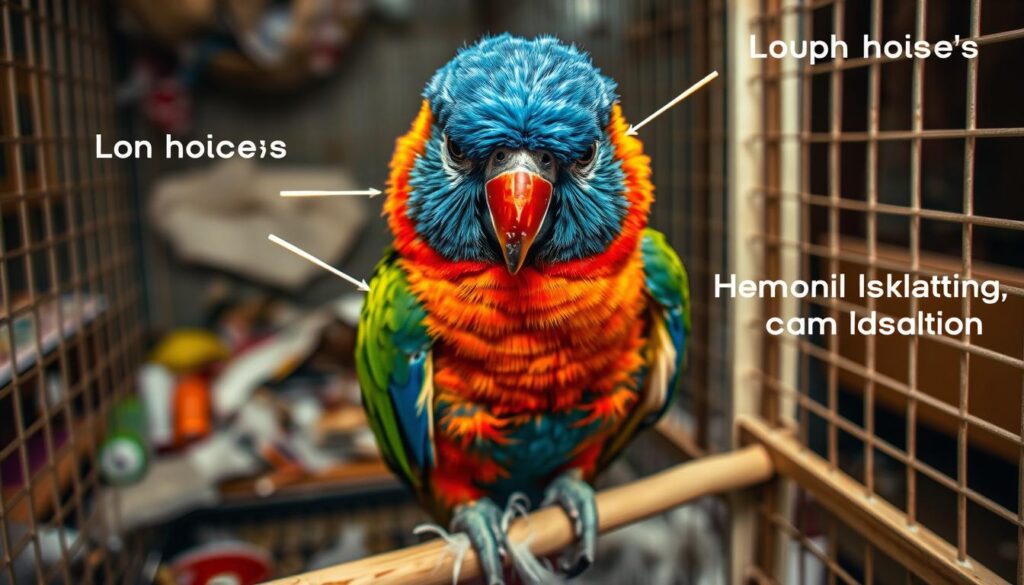
Identifying Symptoms and Triggers
Recognizing the early indicators of feather plucking behavior is vital for effective intervention. By understanding the various behavioral signs and environmental triggers, bird owners can take proactive steps to prevent further issues. This section focuses on the significant behavioral changes and external factors that could lead to increased stress in birds.
Behavioral Signs to Watch For
Birds displaying feather plucking behavior often manifest distinctive behavioral signs. Frequent chewing of feathers is a common symptom that should not be overlooked. Additionally, signs of anxiety, such as excessive vocalization or pacing, may indicate increased stress levels. It’s crucial to monitor for lethargy or unusual aggression, as these can signal underlying emotional distress. Changes in grooming habits or noticeable damage to the feathers are further markers to keep an eye on during the identifying triggers phase.
Environmental Triggers That May Cause Stress
Environmental factors play a significant role in the development of feather plucking behavior. Loud noises, sudden changes in household dynamics, or a chaotic environment can significantly contribute to a bird’s anxiety. Other stressors may include improper cage placement that lacks natural light or adequate space for movement. Transitions in routine, like the loss of a companion or relocation of your bird’s cage, can escalate feelings of insecurity. Understanding these stressors is essential for creating a calm living space that supports your bird’s well-being.
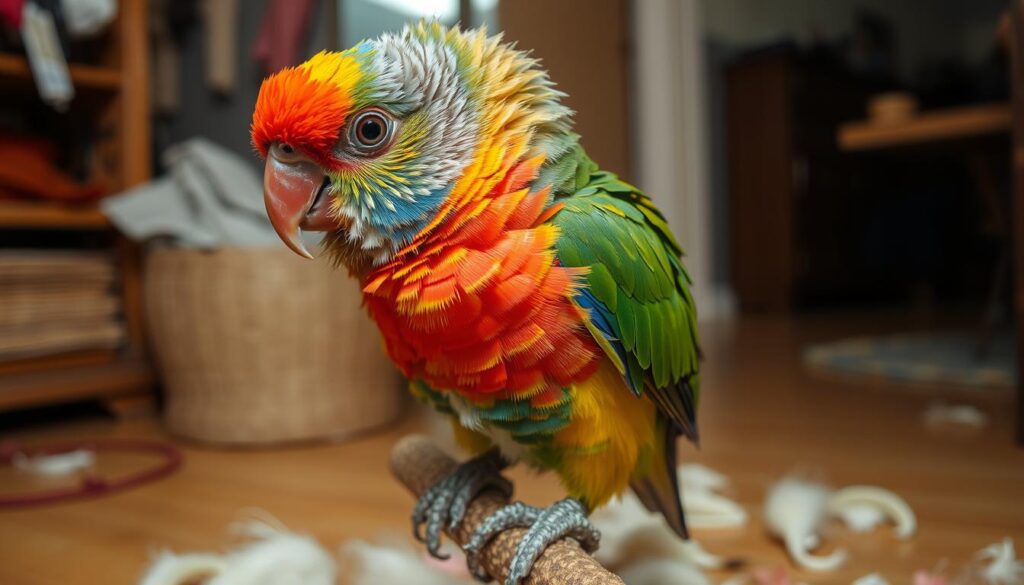
By paying attention to these symptoms and identifying triggers, you can facilitate a supportive environment that mitigates stress and reduces the risk of feather plucking. For further guidance on managing challenges in pet care, explore additional strategies that promote overall well-being for your feathered friends.
Effective Solutions to Stop Feather Plucking
Addressing feather plucking requires a comprehensive approach that focuses on both environmental and behavioral modifications. Early intervention can significantly reduce feather plucking behaviors. By implementing practical bird feather plucking solutions, avian owners can create a happier and healthier environment for their pets.
Creating a Stimulating Environment
A stimulating environment is crucial for a bird’s emotional well-being. Providing a variety of toys and engaging activities can help prevent boredom, which often leads to feather plucking. Establish safe spaces for your bird to explore outside their cage, allowing for physical activity and mental engagement. Incorporate foraging opportunities that mimic natural behaviors. Strategies to enhance a bird’s environment can greatly impact the effectiveness of avian feather plucking treatment.

Behavioral Training Techniques
Behavioral training plays a vital role in correcting feather plucking habits. Techniques such as Applied Behavior Analysis (ABA) can help address and modify undesirable behaviors. Teaching alternative methods for coping with stress can help redirect a bird’s energy towards positive activities. Consistent behavioral training fosters a trusting relationship between the bird and its owner, which is essential for long-term avian feather plucking treatment.
Seeking Professional Help
If feather plucking persists despite these interventions, seeking guidance from an experienced avian veterinarian or bird behaviorist is a wise decision. Professionals can assess the situation holistically, identifying any underlying physical or emotional issues. They may recommend specific behavioral training strategies or treatments tailored to your bird’s unique needs. Early and proactive measures are essential for optimal outcomes.
Maintaining Your Bird’s Wellbeing
To effectively manage and prevent feather plucking in birds, ongoing care is essential. One cornerstone of this care is ensuring regular vet check-ups. These visits not only help to promptly identify and address any physical or emotional issues, but they also give you the opportunity to receive expert advice on your bird’s dietary and health needs. A knowledgeable avian vet can significantly contribute to your bird’s wellbeing by optimizing their care routines and identifying potential medical complications before they escalate.
Regular Vet Check-ups
Regular vet check-ups should be scheduled to monitor your bird’s health and catch issues early. These appointments allow you to discuss any behavioral concerns, such as feather plucking, which may indicate underlying health problems. Your vet can provide tailored recommendations to improve your bird’s overall health and ensure a balanced diet that meets their nutritional requirements.
Importance of Social Interaction
Birds are social creatures, and their emotional health depends heavily on social interaction. This can come from interactions with their human caregivers or with other birds. Ensuring that your bird has sufficient companionship will help alleviate feelings of loneliness or stress, which are often linked to feather plucking behaviors. Establishing a routine of social engagement can create a supportive environment that promotes emotional well-being and reduces anxiety.
Providing a Balanced Diet
Additionally, providing a balanced diet is crucial for your bird’s overall health and can directly affect their tendency to pluck feathers. Nutritional deficiencies can lead to mood disorders and behaviors such as feather plucking. A diet rich in vitamins and minerals tailored to your bird’s species will support their physiological health and help mitigate issues related to stress or discomfort. By focusing on regular vet check-ups, fostering social interaction, and ensuring a balanced diet, you can establish a nurturing environment that promotes the overall wellbeing of your bird.

